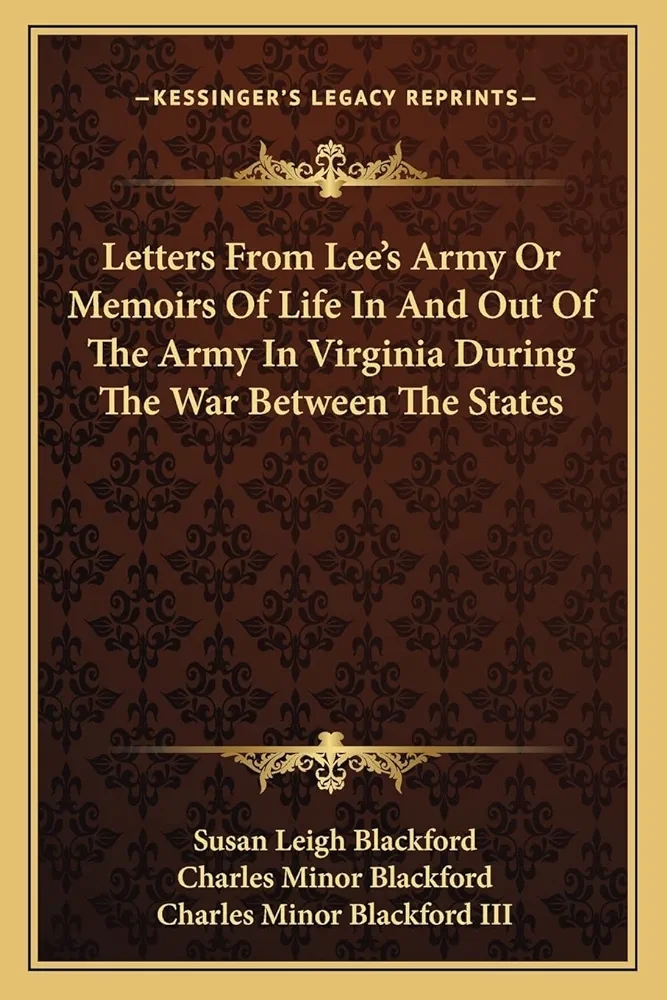I heard someone recently saying that certain stories such as firsthand accounts land much better when heard than read. When a.figure tells their own story, reads their own letters, or in general passes on an oral history account, sometimes it’s better to perceive an actual voice. I tend to agree with this, especially with letters. Let’s take a quick look at the book and I’ll share my thoughts
Bookish Quick Facts
- Title: Letters from Lee’s Army
- Authors: Charles Minor Blackford, Susan Leigh Blackford (edited by their grandson)
- Narrators: Matthew Steward & Susie Berneis
- Release: late 1800’s originally, reprinted 2010 by Kessinger Publishing / Dreamscape Media LLC
- Length: 11h2m (about 320 pages)
- Rate & Recommend: ⭐⭐⭐⭐
Here’s the Synopsis:
Charles Minor Blackford was a Virginia aristocrat who fought for the Confederacy as much out of obligation to his class and region as for political reasons. Letters from Lee’s Army presents the correspondence between Captain Blackford and his wife, Susan Leigh Blackford, during the war. While Captain Blackford writes of the rigors of campaigning—the dramatically bad food, the constant dysentery, the cold and wet—we see the stoic Susan Blackford gradually relying less and less on her husband to make decisions.
During the course of the war Susan Blackford lost her home, three children, and her belongings to the struggle, all without the camaraderie and sustaining sense of purpose known to the soldier. These letters emphasize the stresses that war and separation can place on a marriage. Blackford enlisted in the Second Virginia Cavalry at the outset of the war and in 1863 was posted to Longstreet’s Corps
From Am*zon
My Thoughts
The two narrators, Matthew Steward and Susie Berneis, do a great job reading back and forth with obviously defined roles. Many letters are omitted from the compilation due to lack of perceived reader interest, but what is left is an often harrowing account of a man at war and a woman who has to find her own agency in a hurry as her home is being torn away piece by piece.
I like reading letters because frankly this is where many history books get their information from. You get firsthand accounts of battles and the generals, anecdotes and shenanigans, and fun stories like the trial of a sheep found wandering and the great snowball fight. Then you know, it might be bodies piled into retaining walls or children dying from poor care and disease.
The intro pointed out that family life was the part most likely to slip through the cracks of history and I don’t think they’re wrong. This is a great account of the price gouging of many items like cloth and coffee, meat, flour, horses, and pretty much anything that anyone needed to live as well. I don’t know how anyone in the south survived honestly with scraps for food and even the rich struggling to feed their households. One other account I found interesting was the lack of hospital care towards the end – more wounded coming into the cities than anyone could house or take care of. Also the treatment of the college folks by the Union (generally good) and some of the shenanigans the women pulled on their guards.
I wished for a little more closure at the end but all we would get was given in the intro/forward. Susan wrote at the end that she cut off where she did due to the ending of the story she wanted to tell. That said, I’d still like a few paragraphs on how her life ended up since the book, originally I believe published in the late 1800s, gave her enough time to be settled into whatever life she eventually found. The whole book showed a general trend towards Susan (and women in general) making their own decisions and relying on husbands less as things got more dire and they got used to being on their own. That said, I’m curious how her life turned out.
Overall this book works really well on audio and does a great job showing both officers lives and family struggles during the Civil War.
Do you like reading letters? Which ones interest you the most??

